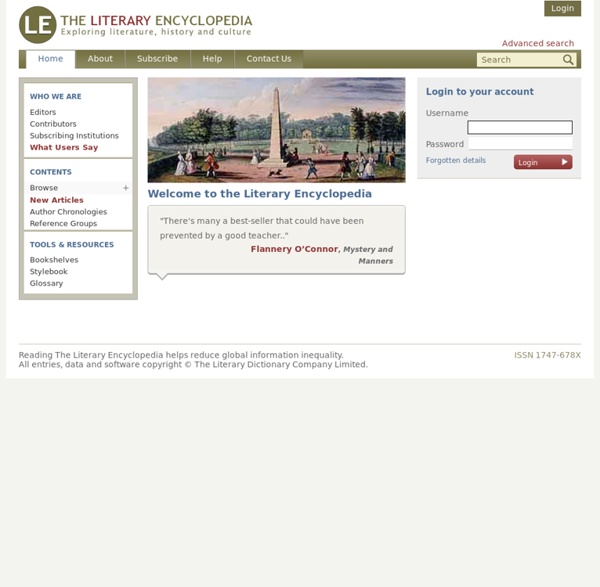



Table of Contents abduction (Igor Douven) Abelard [Abailard], Peter (Peter King) Abhidharma (Noa Ronkin) abilities (John Maier) Abner of Burgos (Shalom Sadik) Abrabanel, Judah (Aaron Hughes) abstract objects (Gideon Rosen) accidental properties — see essential vs. accidental properties action (George Wilson and Samuel Shpall) action-based theories of perception (Robert Briscoe and Rick Grush) action at a distance — see quantum mechanics: action at a distance in actualism (Christopher Menzel) adaptationism (Steven Hecht Orzack and Patrick Forber) Addams, Jane (Maurice Hamington) Adorno, Theodor W. (Lambert Zuidervaart) advance directives (Agnieszka Jaworska) Aegidius Romanus — see Giles of Rome Aenesidemus — see skepticism: ancient aesthetic, concept of the (James Shelley) aesthetics aesthetics of the everyday (Yuriko Saito) affirmative action (Robert Fullinwider) Africana Philosophy (Lucius T. Outlaw Jr.) B [jump to top] C [jump to top] D [jump to top] Damian, Peter (Toivo J.
MyiLibrary Encyclopedia Britannica Web of Science (knowledge) WEB OF Science Your ideal single research destination to explore the citation universe across subjects and around the world. Web of Science provides you access to the most reliable, integrated, multidisciplinary research connected through linked content citation metrics from multiple sources within a single interface. And since Web of Science adheres to a strict evaluation process, you can be assured only the most influential, relevant, and credible information is included - allowing you to uncover your next big idea faster. Web of Science connects the entire search and discover process through: Premier Multidisciplinary Content Emerging Trends Subject Specific Content Regional Content Research Data Analysis Tools Learn more about Web of Science Take advantage of many great features when you register. Learn more about the benefits of registering for an account
Encyclopedia of Earth WorldTradeLaw.net - The Online Source for World Trade Law Stanford Encyclopedia of Philosophy Mintel Concise Encyclopedia of Economics| Library of Economics and Liberty Harry Johnson, a Canadian, was one of the most active and prolific economists of all time. His main research was in the area of international trade, international finance, and monetary policy. One of Johnson's early articles on international trade showed that a country with monopoly power in some good could impose a tariff and be better off, even if other countries retaliated against the tariff. His proof was what is sometimes called a "possibility theorem"; it showed that such a tariff could improve the country's well-being, not that it was likely to. Johnson, realizing the difference between what could be and what is likely to be, was a strong believer in free trade. Indeed, he often gave lectures in his native Canada excoriating the Canadian government for its protectionist policies and arguing that Canada could eliminate some of the gap between Canadian and U.S. standards of living by implementing free trade....
International Encyclopedia of Communication Online: Home Published in association with the International Communication Association Welcome to the International Encyclopedia of Communication Online, a vast library giving instant access to the most authoritative and up-to-date scholarship in your field. With unbeatable functionality, students, lecturers, and researchers will find the International Encyclopedia of Communication Online an invaluable learning, teaching, and research resource. You can access the content in a number of ways: Browse table of contentsUse Explore for sophisticated browsing across subjects, people, periods, places, and key topicsUse Quick Search found on top right hand corner of every page or the Advanced Search for more precise search requirements Updated twice a year, The International Encyclopedia of Communication Online ensures that you are kept abreast of developments in the field. Since 2009, there have been over 300 updates adding a total of 30 new entries to the collection and updating a further 274.